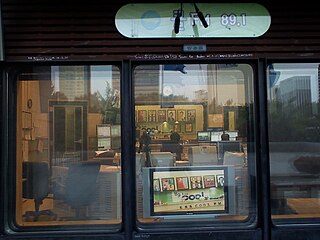Digital radio is the use of digital technology to transmit or receive across the radio spectrum. Digital transmission by radio waves includes digital broadcasting, and especially digital audio radio services.

SK Telecom Co., Ltd. is a South Korean wireless telecommunications operator; it is part of the SK Group, one of the country's largest chaebols.

SK Group, also known as SK Holdings, is one of the largest conglomerates (chaebol) in South Korea. SK Group is composed of 95 subsidiary companies that share the SK brand and culture named SKMS. It changed its name from Sunkyong Group to SK Group in 1997.

WiBro is a wireless broadband Internet technology developed by the South Korean telecoms industry. WiBro is the South Korean service name for IEEE 802.16e international standard. By the end of 2012, the Korean Communications Commission intends to increase WiBro broadband connection speeds to 10Mbit/s, around ten times the current speed, which will complement their 1Gbit/sec fibre-optic network.
MobaHO! (モバHO!) was a mobile satellite digital audio/video subscription based broadcasting service in Japan, whose services began on October 20, 2004 and ended on March 31, 2009 at 3:00 pm Japan time. MobaHO! used the ISDB digital broadcast specification. The satellite, MBSat 1, providing this service is jointly owned by SK Telecom of South Korea and Mobile Broadcasting Corporation (MBCO) of Japan; TU, South Korea's now defunct S-DMB mobile television service under SK Telecom, used to share same satellite.

Munhwa Broadcasting Corporation is one of the leading South Korean television and radio network companies. Munhwa is the Korean word for "culture". Its flagship terrestrial television station MBC TV is Channel 11 (LCN) for Digital.

KT Corporation, formerly Korea Telecom, is South Korea's largest telephone company.

The Busan Metro operated by the Busan Transportation Corporation is the urban rail system of Busan, South Korea. The metro network first opened in 1985 with seventeen stations. The Metro itself consists of 4 lines, cover 116.5 kilometres (72.4 mi) of route and serving 114 stations.

Mobile television is television watched on a small handheld or mobile device. It includes pay TV service delivered via mobile phone networks or received free-to-air via terrestrial television stations. Regular broadcast standards or special mobile TV transmission formats can be used. Additional features include downloading TV programs and podcasts from the Internet and storing programming for later viewing.
YTN Group is a multimedia group of YTN, producing media, broadcast and telecommunication products.
TrueVisions is a cable and satellite television operator in Thailand. TrueVisions is owned by the True Corporation. Until February 2007, it was called the United Broadcasting Corporation (UBC) or UBC-True.
KT SkyLife is a satellite broadcasting provider in South Korea. It is a subsidiary of KT Corporation.
Mobile TV Format is a colloquial and collective name for technology standards set out for broadcasting TV services to mobile devices, mostly mobile handsets for now. Currently, there are four prevalent formats known as DMB, DVB-H, OneSeg and MediaFLO. As of December 2007, ITU approved T-DMB, DVB-H, OneSeg and MediaFLO as the global standard for real-time mobile video and audio broadcasting. Thus far, none of the four formats has secured a dominant position in the global market, except in their respective home markets.

Digital multimedia broadcasting (DMB) is a digital radio transmission technology developed in South Korea as part of the national IT project for sending multimedia such as TV, radio and datacasting to mobile devices such as mobile phones, laptops and GPS navigation systems. This technology, sometimes known as mobile TV, should not be confused with Digital Audio Broadcasting which was developed as a research project for the European Union. DMB was developed in South Korea as the next generation digital technology to replace FM radio, but the technological foundations were laid by Prof. Dr. Gert Siegle and Dr. Hamed Amor at Robert Bosch GmbH in Germany. The world's first official mobile TV service started in South Korea in May 2005, although trials were available much earlier. It can operate via satellite (S-DMB) or terrestrial (T-DMB) transmission. DMB has also some similarities with the main competing mobile TV standard, DVB-H.

KBS Cool FM (also known as KBS 2FM Hangul : KBS 제2FM방송) is a Hot AC music radio station of the Korean Broadcasting System. It plays mostly older K-pop Music from the 90s compared with KBS-FM (2Radio). The station's popular shows are Gayo Plaza, Volume Up and Kiss the Radio.

NexStreaming is a global multimedia software company with headquarters in Seoul (Korea) and branches in the US, China, Spain and Taiwan. Not only have NexStreaming's sales been rising steadily but the proportion of sales to major global media customers and smartphone manufacturers has also been growing. NexStreaming is a publicly traded company listed on the Korean stock market, KOSDAQ.
Arirang Radio is an English-language international broadcaster in Seoul, South Korea. It was founded by the Korea International Broadcasting Foundation in 1996. It receives government subsidies.
KOBACO founded in 1981, is the only media representative in South Korea, operating as an agency that represents every terrestrial broadcasting company of South Korea for their broadcast advertising sales. In May 2012, KOBACO was reborn as a government-funded public media rep.















